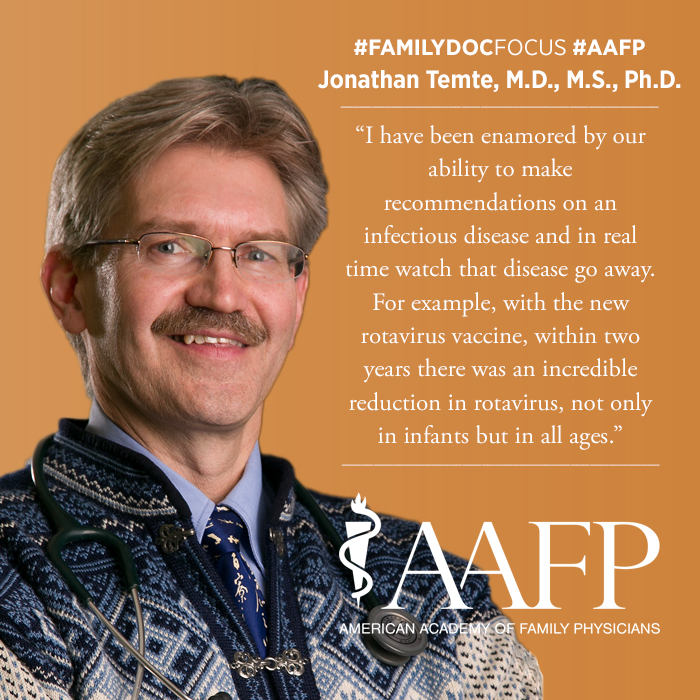Meet Family Medicine's Point Man on Immunizations
January 14, 2019, 11:32 am David Mitchell – Jonathan Temte, M.D., M.S., Ph.D., received the AAFP's Public Health Award last fall in large part for his considerable work related to immunizations. But when Temte first represented the Academy at a national vaccine meeting nearly 20 years earlier, he didn't feel like an expert.

"I was tapped to go to the meeting, though I knew little about measles or immunizations at the time," said Temte, who was serving on the AAFP Commission on Science in 2000 when he attended a CDC meeting regarding the elimination of measles in the United States. "I was blown away by the level of science, the phenomenal vaccine, the molecular epidemiology and the ability to look at a virus and determine where in world it had originated."
The meeting's attendees determined during that event that control measures had been effective in preventing measles from circulating endemically in the United States. All reported cases of the disease were either imported by foreign travelers or connected to imported cases.
Four years later, Temte again represented the AAFP at a similar CDC meeting with a similar result: Rubella was declared eliminated in the United States.
That same year, Temte became the Academy's liaison to the CDC's Advisory Committee on Immunization Practices (ACIP). He continued in that role for four years before becoming a voting member of ACIP in 2008. He served a total of eight years, eventually becoming the first family physician to chair the committee.
"I have been enamored by our ability to make recommendations on an infectious disease and in real time watch that disease go away," said Temte, who has served as chair of the Wisconsin Council on Immunization Practices since 2006. "For example, with the new rotavirus vaccine, within two years there was an incredible reduction in rotavirus, not only in infants but in all ages. The safety and effectiveness of vaccines has been borne out time and time again."
Last year, Temte was appointed to serve a three-year term on the CDC's Board of Scientific Counselors in the Office of Infectious Diseases. The board advises the CDC director and HHS secretary regarding goals and priorities for the programs and research within the CDC's three infectious disease centers: the National Center for Immunization and Respiratory Diseases; the National Center for Emerging and Zoonotic Infectious Diseases; and the National Center for HIV/AIDS, Viral Hepatitis, STD and TB Prevention.
"There's a lot going on there," he said.
The same could be said for Temte's role at the University of Wisconsin School of Medicine and Public Health, where he is a professor in the Department of Family Medicine and Community Health. Temte spends 30 percent of his time on clinical work and 10 percent on teaching, but the bulk of his work is research. He has four studies in process related to influenza surveillance.
Temte, who earned a master of science degree in biological oceanography before going to medical school and a Ph.D. in zoology thereafter, also has a keen interest in research related to how climate change is affecting health.
"It's not going away," he said. "It's going to have large effects."